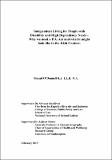| dc.description.abstract | This research examines the legislative context for Independent Living for people with disabilities and high dependency needs in Ireland. The CRPD provides the key platform for this and reaffirms the fundamental rights of people with disabilities for inclusion, independence and equality. It has the key role in articulating the vision of people with disabilities, and people advocating on their behalf, for an inclusive, dignified and independent life with the freedom to make their own choices. Following the principles of the CRPD, I believe we should go a step further by taking the principles of the Convention and make them legally binding in our country in the form of a P.A. Act.
The introduction gives the reader a ‘First-hand Account of Independent Living” through my difficulties of coping with inadequate support leading to social exclusion and alienation, frequently experienced by people with disabilities. I speak candidly about my experiences, as a person with a disability and high dependency needs, throughout my life. The challenges I face on a daily basis are frustrating, depressing and degrading as they chip away at my hunger for independence, dignity and a quality of my life that most people take for granted. Many of these challenges could be avoided if I had sufficient Personal Assistance to allow me to live independently with freedom of choice as per the tenets of the CRPD.
After examining how the key aspects of the Irish disability legal and policy methods relate to the principles of the CRPD, I focus on Independent Living and the types of services needed for this to be realised. People with disabilities are the ‘experts’ on disability and high dependency needs and must be treated as such and involved with the ‘decision-makers’ in their support packages. This is clearly outlined in Article 4.3 of the CRPD.
Education empowers people with disabilities to be more confident, more educated, socially-skilled and more likely to gain employment. In addition, the value of the sense of self-esteem that education brings, cannot be over-estimated in the lives of people with disabilities.
It is with mixed emotions that I conclude the research with recommendations for the Irish Government to provide a rights-based policy and person-centred practice which are progressive and comprehensive for people with disabilities and high dependency needs. We need to look forward and continue our active participation, criticism and advocacy for independence that make our world an inclusive, secure and supported community environment where our struggles will not be so profound. I have hope – optimism is the faith that leads to achievement. | en_IE |


